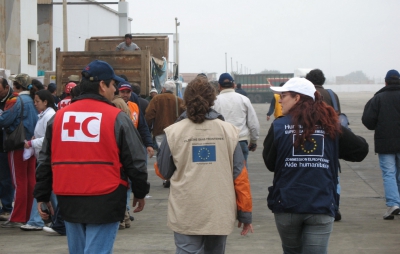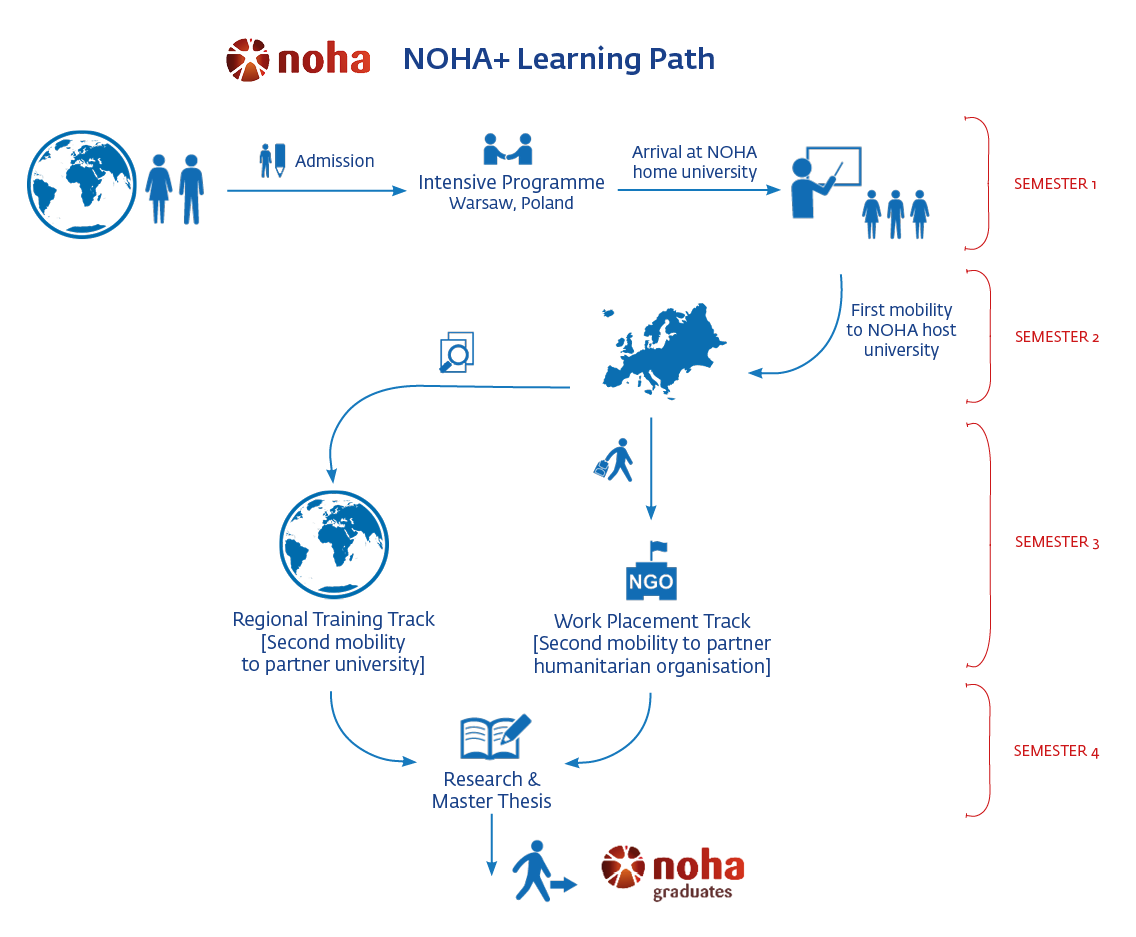Step by Step Instructions
- ALL applications must be made online through the on-line NOHA Application Form HERE
- No print application documents should be submitted unless requested or authorised by NOHA.
- Read through the on-line application form and prepare all of the information for each section of the form as well as all of the documents that you must attach to your application.
- Fill in the on-line application form, completing all of the sections as requested.
- Attach all of the compulsory documents:
- Copy of passport (only the main pages including your full name, passport number, date and place of issue, expiry date)
- Scan of original diploma (if this document is not in English, an official translation should be attached) and, if available, of the Diploma Supplement. If you are offered a place on the programme, you will have to present the original documents, or submit a certified copy of the original documents, when you arrive at the NOHA universities you choose for the first and second semesters
- If you have finished your Bachelor’s studies when you apply but have not yet received your degree: please submit an official document confirming that you have successfully completed your studies and that you will be awarded a degree. The document must be issued through and signed by a representative of the Academic Registrar's Office, the Examinations Office or equivalent.
- If you have not completed your Bachelor’s studies when you apply: please submit an official document stating that you are a currently enrolled student and participating in your last year of studies. The document must be issued through and signed by a representative of the Academic Registrar's Office, the Examinations Office or equivalent.
- Scan of original academic transcripts (if this document is not in English, an official translation should be attached). If you are offered a place on the programme, you will have to present the original documents, or submit a certified copy of the original documents, when you arrive at the NOHA universities you choose for the first and second semesters
- If you have not completed your Bachelor’s studies when you apply: you must still submit transcripts for all courses you have passed so far.
- Curriculum vitae in English. Preferably in Europass format (http://europass.cedefop.europa.eu/en/documents/curriculum-vitae).
- Official proof of language abilities, where applicable:
- English: Ruhr-Universität Bochum (1st & 2nd Semester), University College Dublin (1st & 2nd Semester), Uppsala universitet (1st & 2nd Semester), Rijksuniversiteit Groningen (1st & 2nd Semester), Uniwersytet Warszawski (1st & 2nd Semester), L'Università ta Malta (1st & 2nd Semester),Universidad de Deusto (2nd Semester)
- Only provide certification for French if you are applying for: Aix Marseille Université (1st & 2nd Semester)
- Only provide certification for Spanish if you are applying for : Universidad de Deusto (1st Semester)
- Any other language certificate even if it is not one of the languages of the Consortium.
- Two Reference letters (in English). These must be written on official letterhead paper and signed in original ink (no electronic signatures).
- Please note that family members may not serve as referees. You may submit two academic references, two professional references, or one of both. Where possible, both an academic and professional reference is preferable. The letters have to be dated, and cannot have been written longer than 1 year prior to the date on which candidates submit their application.
- Proof of residence. You may submit one of the following documents as proof of residence:
- a residence certificate issued in accordance with the candidate's municipality’s normal registration rules and issued within 12 months before the submission deadline of applying for an EMJMD student scholarship, i.e. the consortium's official deadline for student application; a municipality certificate must be submitted in Dutch, English, French, German, Maltese, Polish, Spanish or Swedish;
- a certificate from the candidate's place of work, study or training issued by the employer or institution in question issued within 12 months before the submission deadline of applying for an EMJMD student scholarship, i.e. the consortium's official deadline for student application; work/training/study certificates must be submitted in English, otherwise a certified English translation must be provided with the original.
- A document confirming the applicant´s place of residence issued by a notary (in English) is also acceptable
- Any eligible document submitted as proof of residence must have been issued within 12 months of the Consortium´s application Erasmus Mundus scholarship application deadline.
- Publications (if any)
IMPORTANT: Applicants wishing to apply for the Erasmus Mundus grant must comply with all the requirements and submit all the necessary documents by 15th December in order to be considered eligible candidates. This implies that in case you have not completed your undergraduate degree by due date you will not be considered eligible for the grant.
Timeline:
1 October, 2025: Opening of the call for all applications to the programme for the 2026-2028 cohort.
15 December 2025, 23.59pm GMT: Deadline for Erasmus Mundus scholarship applications
- Ineligible candidates will be informed about their status at the beginning of January 2026 and will have 7 days from the moment they receive notification, to submit an appeal.
- Selected candidates will be notified once the Selection Committee has evaluated all candidatures and the final student list has been adopted, in March.
- Non-selected candidates and candidates in the reserve list will receive notification once the Selection Committee has evaluated all candidatures and the final student list has been adopted, in March. Rejected candidates may appeal to the Joint Admissions Board within 7 days from the receipt of the decision notice. Non-selected candidates will be given the option to change their candidature to a self-funded applicant.
1 April, 2026: Central application deadline for all ordinary candidates.
1 July, 2026: Application deadline for those without EU citizenship or valid EU residence permits.
July 2026: Selected and non-selected self-funding candidates will receive official joint notification. However, most universities will contact their selected candidates beforehand.
Selection process for Erasmus Mundus grant applicants:
Admission to the degree programme is determined by the Joint Admissions Board, which has one representative from each university, has the Joint Programme Coordinator as its chairperson, and is supported by the Secretariat.
The Secretariat at the Coordinating institution and the Secretariats at the partner universities assess the applications to check whether the application is complete and meets the minimum set of requirements to make the candidate eligible. The corresponding NOHA selection committee at each Network university will make a preliminary selection of the candidates. The final list of admitted students will be adopted by the Joint Admissions Board which meets a few weeks after the application submission deadline and after evaluation of all eligible applications. The applicants are informed in writing regarding the decision of the Joint Admission Board, which includes information for the student about the possibility to appeal within 7 days of receiving notification.
Final results of successful and unsuccessful candidates can only be released by the end of March. The selection results will be sent to candidates by email.
Procedure of Appeal
Rejected candidates may appeal to the Joint Admissions Board within seven days from the receipt of the decision notice. In the event of an appeal, the Joint Admissions Board may reconsider its decision on the basis of additional information. The procedure of appeal is not an opportunity to submit documents that should have been included in the application. No additional documents will be accepted at this stage.
The Appeal Form can be downloaded from the NOHA website under the documents section. It must be sent to the NOHA Consortium at the following address: nohamasters@deusto.es.
Non selected candidates will be give the option to change their application to a self-funded candidature.
Each university evaluates the applications of self-funding applicants that have applied to the university as their first choice home university. The university selects their own candidates based upon their own national criteria and procedures. The Master Secretariat compiles a joint network student list which is adopted by all universities to clarify mobility paths.
Students who are not selected by their first choice of home university may be selected by their second or third choice universities or may be asked if their application can be passed along to another university.
Final results of successful and unsuccessful candidates can only be released in summer 2025, although most universities will contact their selected students beforehand.
The selection results will be sent to candidates by email. For specific questions on applying as a self-funding student, applicants should directly contact the coordinator at their first choice home university.
*Collection of data in accordance with the Regulation (EC) N° 45/2001 of the European Parliament and of the Council of 18.12.2000 on the protection of individuals with regards to processing personal data.






